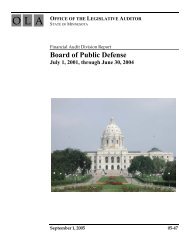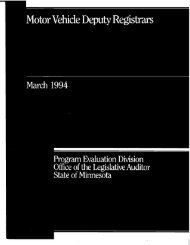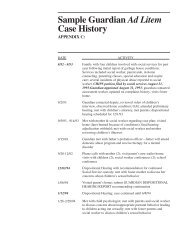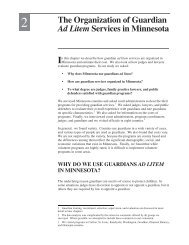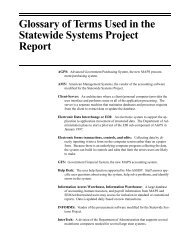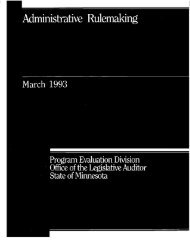Occupational Regulation - Office of the Legislative Auditor
Occupational Regulation - Office of the Legislative Auditor
Occupational Regulation - Office of the Legislative Auditor
You also want an ePaper? Increase the reach of your titles
YUMPU automatically turns print PDFs into web optimized ePapers that Google loves.
10 OCCUPATIONAL REGULATION<br />
Figure 1.1: Organization <strong>of</strong> Pr<strong>of</strong>essional and<br />
<strong>Occupational</strong> <strong>Regulation</strong>: Three Models<br />
Several<br />
organizational<br />
models operate<br />
across <strong>the</strong><br />
country, each<br />
with certain<br />
strengths and<br />
weaknesses.<br />
Model 1:<br />
Model 2:<br />
Model 3:<br />
Boards are autonomous. They hire <strong>the</strong>ir own staff, make decisions<br />
about <strong>of</strong>fice location, purchasing, and procedures. Each board<br />
receives and investigates complaints and disciplines licensees.<br />
Each board is responsible for <strong>the</strong> preparation, conduct, and grading<br />
<strong>of</strong> examinations or <strong>the</strong> contracting out <strong>of</strong> <strong>the</strong>se tasks. Each board<br />
sets qualifications for licensing and standards for practice. Boards<br />
collect fees and maintain financial records. Board staff prepares<br />
and mails applications for licensing and renewal, and answers<br />
inquiries from licensees and <strong>the</strong> public.<br />
Boards are autonomous and have decision making authority in<br />
many areas. The central agency, however, has greater authority<br />
over certain functions. Its powers go beyond housekeeping. For<br />
example, board budgets, personnel, and records may be subject to<br />
some control by <strong>the</strong> agency. Complaints, investigations, and<br />
adjudicatory hearings may be handled by a central staff, even when<br />
boards continue to make final decisions with respect to disciplinary<br />
actions.<br />
The regulatory system is run by an agency director, commission, or<br />
council, with or without <strong>the</strong> assistance <strong>of</strong> a board. Where boards do<br />
exist, <strong>the</strong>y are strictly advisory. The agency director, commission,<br />
or council has final decision making authority on all substantive<br />
matters. Boards may be delegated such functions as preparing or<br />
approving exams, setting pass/fail points, recommending<br />
pr<strong>of</strong>essional standards, and recommending disciplinary sanctions.<br />
SOURCE: Adapted from Benjamin Shimberg and Doug Roederer, with Kara Schmitt, ed., Questions<br />
a Legislator Should Ask, (Lexington, KY: The Council on Licensure, Enforcement and <strong>Regulation</strong>,<br />
1989), 20-21. Models 1, 2, and 3 directly correspond to Shimberg and Roederer’s models A,<br />
C, and E, respectively.<br />
centralized investigative functions tend to take greater disciplinary actions than<br />
those where <strong>the</strong> investigative functions are left to each independent board. 34 Thus,<br />
<strong>the</strong> researchers observe that, “<strong>the</strong> hypo<strong>the</strong>sized advantages <strong>of</strong> centralization may<br />
apply for some specialized functions.” 35<br />
34 In Minnesota certain investigative functions are centralized in <strong>the</strong> Attorney General’s <strong>Office</strong>.<br />
This is discussed in greater detail in Chapter 3.<br />
35 Elizabeth Graddy and Michael B. Nichol, “Structural Reforms and Licensing Board Performance,”<br />
(1990): 393-4. They also find that <strong>the</strong> disciplinary actions <strong>of</strong> independent boards is<br />
strongly and positively related to <strong>the</strong> number <strong>of</strong> board-controlled investigators. These findings<br />
lead <strong>the</strong> researchers to <strong>the</strong> preliminary conclusion that <strong>the</strong> key to disciplinary action lies less with<br />
<strong>the</strong> institutional arrangement, and more with <strong>the</strong> amount <strong>of</strong> resources dedicated to <strong>the</strong> investigation<br />
<strong>of</strong> complaints.



